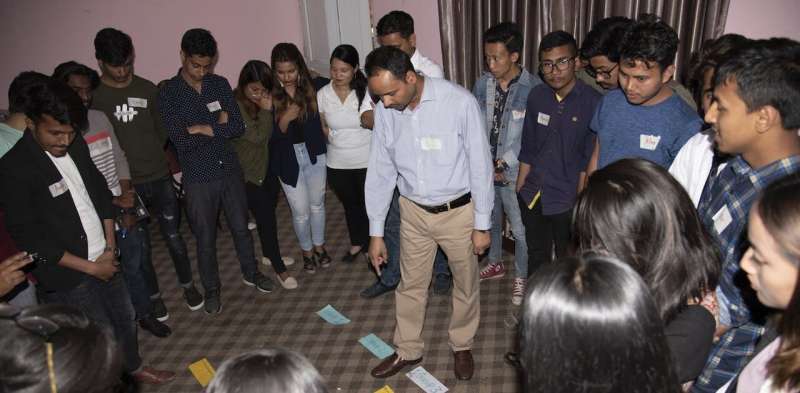What's 'deliberative' democracy? Research in Nepal shows it could spur global youth voting

After local elections in Nepal earlier this year, the Kathmandu Post expressed some alarm that Nepalis were losing interest in voting.
Across the country, election participation fell by 10 percentage points, from 74% in 2017 to 64% in 2022.
We in Canada should envy even the lower figure as similar elections here —Ontario's June 2022 election, in particular—drew less than half of the voting populace.
Voter apathy is a global phenomenon and is a significant threat to democracy. Apathetic voters make it easier for autocrats and powerful interest groups to cynically manipulate election results.
Recent local election in Nepal saw many independent candidates paving pathway to victory.#LocalElections2022 #nepalelection2079 pic.twitter.com/ErPwpJPHZO
— Centre for Social Inclusion and Federalism (@CsifNepal) May 30, 2022
Youth political apathy indicates distrust in contemporary political culture.
German sociologist Karl Mannheim once argued that young people must adapt the social institutions of the past to the contemporary realities they are born into.
But youth around the world are contending with issues today that their parents barely encountered, including precarious labor markets, extended demand for higher education, globalizing technologies and shifting gender relations. They are understandably questioning how aging democratic institutions are relevant to their needs.
Nepal is a new democracy, and those institutions were won after decades of civil war and political struggle. That's why Nepalis participate in their elections at levels that put most of the rest of the democratic world to shame. But voting is not all there is to democracy.
Citizens make decisions
In a representative democracy, voters choose which politician or political party will make decisions about contemporary realities on their behalf. Politicians and political parties have a great deal of power to define what those realities are and how they should be addressed.
Contesting and corrupting that power has become a central focus in many democracies. But what gets lost is the deliberative potential of democracy, in which citizens debate contemporary issues among themselves so that the decisions they make together carry more weight and are more broadly legitimate.
As a professor of youth studies, I have been researching political engagement with a team of Nepali youth activists for the past decade. We took the idea of deliberative democracy to young Nepalis through a series of youth assemblies held across the country in 2018 and 2019.
In deliberative assemblies, also known as "mini-publics," a group of citizens selected to accurately reflect the diversity of the population is assigned the task of deliberating a contemporary issue. They then craft a common position that is used to inform decisions made by their political representatives.
Deliberative assemblies have been used around the world to address issues like participatory budgeting (in Porto Alegre, Brazil), constitutional reform (in Ireland) and electoral reform (in British Columbia).
Our youth assemblies were designed to reflect Nepal's diversity. More than 200 youths participated, and were drawn from the Brahmin-Chetris castes, the traditional political elites of the country; the Adivasi Janajati, Nepal's Indigenous and ethnic groups; the Madhesi, the culturally and linguistically distinct peoples that inhabit the plains that border India; and the Dalits, or "untouchable" castes that have for centuries been subjected to menial labor and debt bondage.
Heated debates
There was also an even balance between men and women, and participants included those who identified as LGTBQ or who had disabilities, two communities that have had little recognition in the country.
During the assemblies, participants were tasked with composing a collective declaration that identified five priorities for Nepal's political leadership to address.
The debates that led to these declarations were contentious and often heated, showing that Nepali youth had many different visions about how to define and address Nepal's contemporary problems. There was consensus, however, on the need for broader equality and the reform of Nepal's political culture, which is dominated by powerful, high-caste males and riddled with nepotism.
These declarations alone would have limited value if there were no uptake by political decision-makers. But using deliberative mini-publics as a model, youth delegates presented their declarations to a panel of political leaders from all three levels of Nepal's government.
Deliberative democracy, however, is not yet a feature of Nepal's political culture. Leaders are more familiar with mobilizing youth for political action than they are with actually heeding young people.
Several of the leaders invited to the assemblies politely listened to the youth declarations and then gave stump speeches as if to an election rally. But others were challenged by the youth delegates and responded to their priorities.
Our youth assemblies were experimental, and the political leaders who attended them were under no obligation to act upon anything they learned from them. But they did show that deliberation and dialogue can inspire political engagement.
In a documentary video about our research, young Nepalis show that they are articulate, capable and passionate advocates for themselves and their communities.
At a time when democratic norms appear to be in decline around the world, deliberative democracy is one remedy that our research with Nepali youth suggests is worth pursuing.
Provided by The Conversation
This article is republished from The Conversation under a Creative Commons license. Read the original article.![]()



















